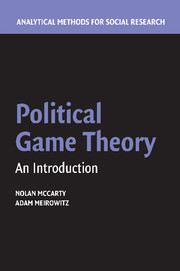Book contents
- Frontmatter
- Contents
- Acknowledgments
- 1 Introduction
- 2 The Theory of Choice
- 3 Choice Under Uncertainty
- 4 Social Choice Theory
- 5 Games in the Normal Form
- 6 Bayesian Games in the Normal Form
- 7 Extensive Form Games
- 8 Dynamic Games of Incomplete Information
- 9 Repeated Games
- 10 Bargaining Theory
- 11 Mechanism Design and Agency Theory
- 12 Mathematical Appendix
- Bibliography
- Index
10 - Bargaining Theory
Published online by Cambridge University Press: 05 June 2012
- Frontmatter
- Contents
- Acknowledgments
- 1 Introduction
- 2 The Theory of Choice
- 3 Choice Under Uncertainty
- 4 Social Choice Theory
- 5 Games in the Normal Form
- 6 Bayesian Games in the Normal Form
- 7 Extensive Form Games
- 8 Dynamic Games of Incomplete Information
- 9 Repeated Games
- 10 Bargaining Theory
- 11 Mechanism Design and Agency Theory
- 12 Mathematical Appendix
- Bibliography
- Index
Summary
If political science is the study of “who gets what, when and how,” then bargaining theory lies at its foundation. Legislators and executives bargain over new legislation. States bargain to reach new international agreements and to settle crises. Political parties bargain over coalition governments. And so on.
Not surprisingly, given bargaining's importance, the application of game theoretic models of bargaining to study political processes is a very active area of research. These models focus on two sets of issues. The first are questions of distribution – “who wins” and “who loses.” Does the president get his preferred legislation? Which country gets to control the disputed region? Which parties receive government portfolios? The second important question concerns the efficiency of political bargaining. Does the bargaining process itself consume resources or fail to reach outcomes that make everyone better off? Does legislative bargaining end in gridlock or a veto even though there are policy compromises that all prefer? Do international disputes end in costly militarized conflicts and wars? Why does it take so long to form new coalition governments?
In this chapter, we review some of the most important bargaining models and their application to political science.
The Nash Bargaining Solution
One of the earliest attempts to model bargaining is the framework developed by John Nash. His approach is axiomatic; it stipulates a number of features that should characterize the outcome of any bargaining situation.
- Type
- Chapter
- Information
- Political Game TheoryAn Introduction, pp. 275 - 319Publisher: Cambridge University PressPrint publication year: 2007

